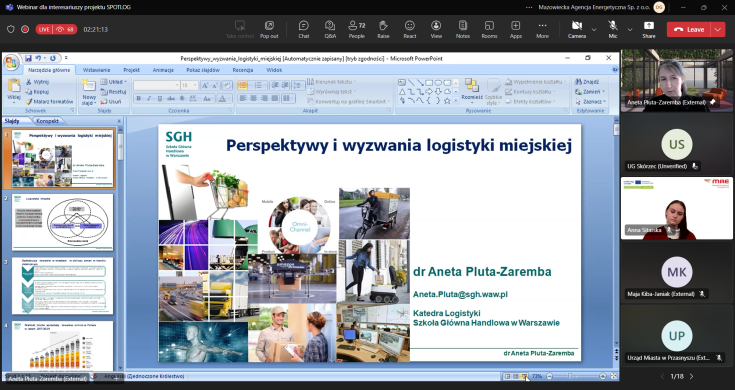Collaboration and dialogue in logistics: new RSGM at MAE

On February 25, 2025, the fourth Regional Stakeholder Group Meeting was organized by Mazovia Energy Agency which brought together 99 participants, including representatives from municipalities, cities, and local government units across Poland.
The event, held online, aimed to facilitate knowledge exchange and highlight best practices in urban logistics, with a particular focus on sustainable, low-emission solutions and last-mile logistics.
The meeting began with a SPOTLOG overview: its objectives, and key areas of focus so to underline its role in promoting innovative solutions for urban freight transport, particularly in the context of last-mile deliveries and zero-emission logistics.
The first presentation was delivered by Professor Maja Kiba-Janiak from Wroclaw Economy University who discussed the concept of a microhub in Wrocław and other effective urban logistics solutions being implemented in different cities. Her presentation provided valuable insights into how microhubs can help optimize last-mile deliveries while reducing congestion and emissions.
Next, Dr. Aneta Pluta-Zaremba from SGH Warsaw School of Economics presented the challenges and future perspectives of urban logistics, shedding light on key trends, regulatory aspects, and the evolving needs of cities in managing sustainable transport solutions. Particular emphasis was placed on the role of last-mile logistics in shaping efficient and environmentally friendly urban freight systems.
A discussion session followed to exchange thoughts, experiences, and ask questions to the experts. The discussion highlighted the importance of collaboration between local governments, businesses, and researchers in shaping the future of urban logistics.
The final part of the webinar featured a presentation by Anna Sitarska and Dominika Grodkowska from MAE, who showcased best practices implemented within the SPOTLOG project. The presentation provided concrete examples of successful initiatives, illustrating how cities can adopt innovative strategies to improve urban freight efficiency, optimize last-mile deliveries, and minimize environmental impact.
The event successfully fostered dialogue and knowledge-sharing among stakeholders, reinforcing the importance of sustainable urban logistics solutions, and helping to define some key takeaways:
- Microhubs and Last-Mile Logistics Solutions – Microhubs, like the one in Wrocław, are an effective way to optimize last-mile deliveries, reduce congestion, and minimize environmental impact in urban areas.
- Collaboration and Dialogue in Urban Logistics – Open communication and cooperation between local governments, businesses, and researchers are essential for developing and implementing effective, sustainable logistics solutions. The discussion during the webinar highlighted the need for ongoing dialogue to address emerging challenges.
- The Future of Urban Logistics – Cities must adapt to evolving trends and challenges in logistics, including digitalization, regulatory changes, and sustainability goals. Innovative approaches and proactive policymaking will be key to ensuring efficient and eco-friendly urban freight systems.
